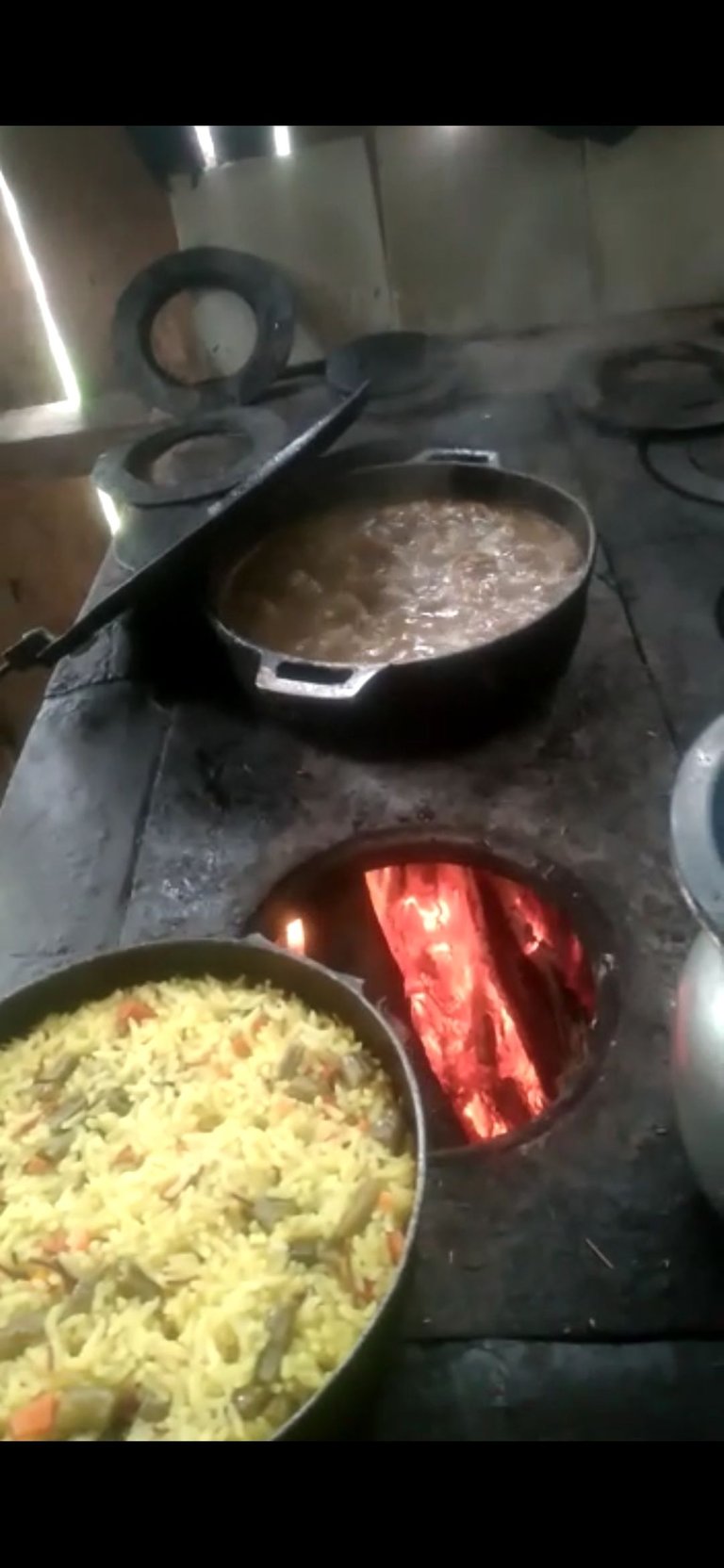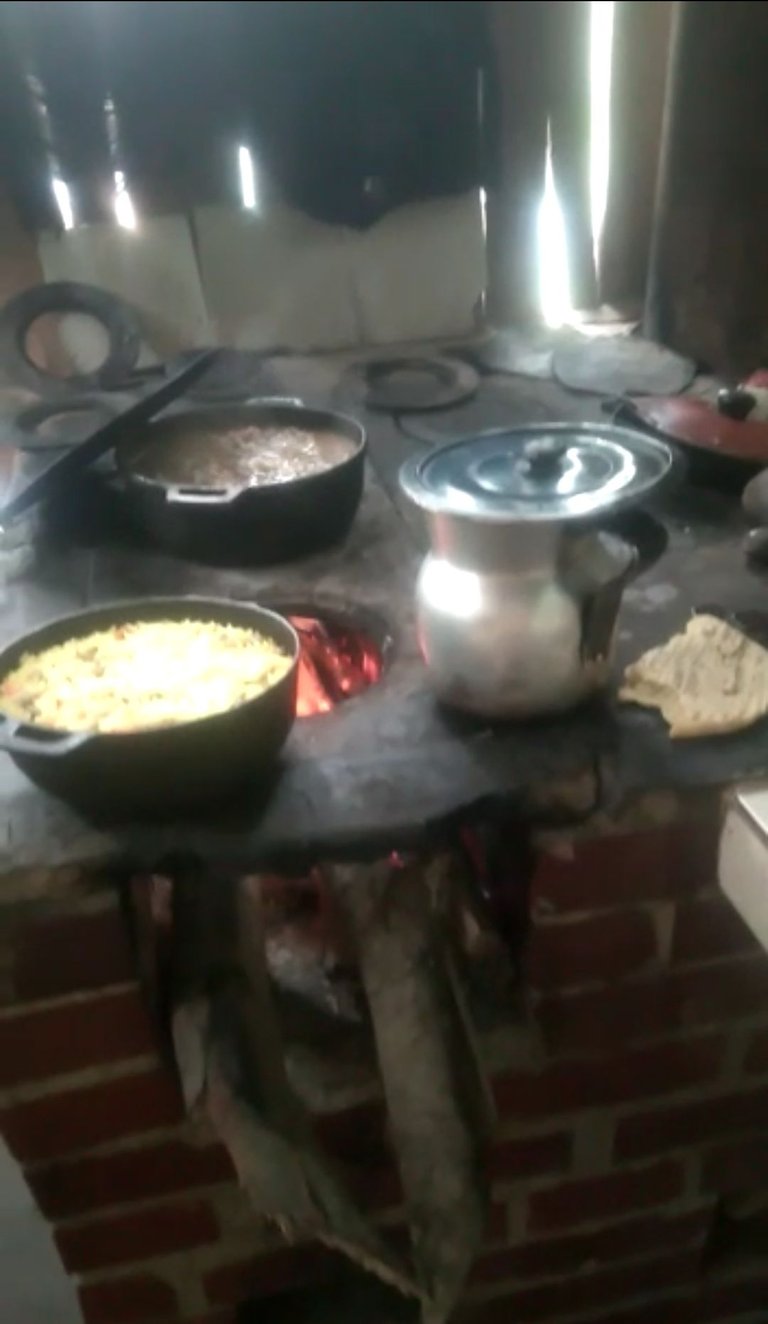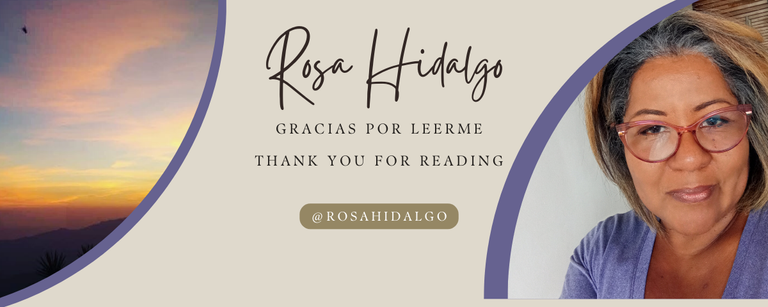Concurso Paisajes Venezolanos | El fogón de Gladys un paisaje un poema / Venezuelan Landscapes Contest | El fogón de Gladys a landscape a poem

Fotografía cortesía: Gladys Aular / Photo courtesy: Gladys Aular
🔥VERSION ESPAÑOL🔥
Saludos a esta comunidad @Venezuela, no puedo dejar de pasar por aquí, en honor a mi origen y como venezolana que soy dejar mi participación en el Concurso Paisajes Venezolanos anunciado, es también un inicio para mi y me gusta acompañarlos en este primer paso. Voy a anotarme con una manifestación de la costumbre. Cocinar en fogón.
COCINAR EN FOGÓN.
Este es un poema y puede ser una historia que sucede en otras partes del mundo, pero yo quiero hacer alusión de Venezuela y mi prima Gladys Aular, vive en un barrio de mi país y allí cocina con fogón. Esto lejos de ser un retroceso, es para mi y para ella un espacio de goce, no solo de sabores si no de recrear lo ancestral, el origen. Es interesante como suceden estas cosas en plena ciudad, pero además es interesante como esto pertenece a nuestra venezolanidad y es por eso que el espacio de interpretaciones puede darse desde el placer.
Gladys ama cocinar en fogón, es una mujer humilde, muy parlanchina, organiza eventos con su gente en el barrio y donde quiera que va se le ocurre el disfrute cultural y popular. Pero esto de cocinar en fogón, me resultó tan interesante y natural para ella que quise traerlo aquí. Como un momento de participación de vuelta a la nuestro. A aquellas miradas de tradiciones, que paisajea de donde venimos, engalana los pueblos, pero verlo en lo urbano es un momento de identidad propia, de representación, de presencia de la venezolanidad.
El fogón es una especie de estufa que se hace en principio y hace muchos años en piedra en la que es puesta leña para cocinar, es una forma tradicional de cocinar en pueblos y se acostumbra hacer las hallacas de diciembre y el sancocho dominguero familiar. Cuando era niña este lugar de la cocina era amplio y siempre esta puesta la leña como combustión para el calor y preparar los guisos.
EL FOGÓN DE GLADYS.
Expuesta la leña, el calor, el fuego
Que ella hace, los recuerdos de esa niñez.
Las comidas, los sabores, los guisos.
Cocinar en piedras o en hierros, la delicia
De colocar la paila y hacer el café del día
De dejar ese calor para cuando saborear
El fuego alumbra el recuerdo, es una danza
Me lleva y me trae, me regresa, me alegra
Todavía existe, todavía hay origen,
todavía hay tradición
Todavía las tías que cocinan y
sacan suculentas
delicias. Lengua en salsa, caraotas, cafecito,
Arepas, ese sabor a leña esa cosa que es ahumado
Que traspasa el paladar es un viaje ancestral
Que penetra por la olla y despliega un no se qué
Una química, una física, una cosa que los sabores
Son otros son de pueblo, son de mí, es un viaje
Ese fogón es una nave espacial, me transporta
Hoguera, bendita, bonita hoguera, soplada para que arda
Eso es la cocina, eso es fuego, piedras, leña.
Eso es hoy para Gladys un fogón su alegría,
Lo exhibe y se maravilla de su belleza.
🔥 🔥 🔥 🔥 🔥 🔥 🔥 🔥 🔥 🔥 🔥
Saludos Venezolanos a los Venezolanos, muchos serán los paisajes, esta también es una forma de paisajear, con vistas, con recuerdos, evocaciones de la venezolanidad.
🔥ENGLISH VERSION🔥
Greetings to this community @Venezuela, I can not fail to stop by here, in honor of my origin and as a Venezuelan that I am let my participation in the Venezuelan Landscapes Contest announced, it is also a start for me and I like to accompany you in this first step. I am going to sign up with a manifestation of the custom. Cooking on the stove.
COCINAR EN FOGÓN.
This is a poem and may be a story that happens in other parts of the world, but I want to allude to Venezuela and my cousin Gladys Aular, lives in a neighborhood of my country and there she cooks with a stove. This, far from being a setback, is for me and for her a space of enjoyment, not only of flavors but also of recreating the ancestral, the origin. It is interesting how these things happen in the middle of the city, but it is also interesting how this is part of our Venezuelan culture and that is why the space of interpretations can be given from the pleasure.
Gladys loves to cook in fogón, she is a humble woman, very talkative, she organizes events with her people in the neighborhood and wherever she goes she thinks of cultural and popular enjoyment. But I found this cooking on the stove so interesting and natural for her that I wanted to bring it here. As a moment of participation back to ours.
To those looks of traditions, that landscape of where we come from, adorns the towns, but to see it in the urban is a moment of own identity, of representation, of presence of the Venezuelanity.
The fogón is a kind of stove that is made in principle and many years ago in stone in which wood is placed for cooking, it is a traditional way of cooking in villages and it is customary to make the hallacas in December and the family Sunday sancocho. When I was a child this place of the kitchen was wide and always put the firewood as combustion for the heat and to prepare the stews.
GLADYS' STOVE.
Exposed the firewood, the warmth, the fire
that she makes, the memories of that childhood.
The meals, the flavors, the stews.
Cooking on stones or in irons, the delight
To place the paila and make the coffee of the day.
To leave that heat for when to savor
The fire illuminates the memory, it is a dance
It takes me and brings me back, it brings me back, it cheers me up
It still exists, there is still origin,
there is still tradition
There are still aunts who cook and
and bring out succulent
delicacies. Lengua en salsa, caraotas, cafecito,
Arepas, that wood-fired flavor, that smoky stuff...
That pierces the palate is an ancestral voyage
That penetrates through the pot and unfolds a something I don't know what
A chemistry, a physics, a thing that flavors
Are others are from the people, they are from me, it's a journey.
That stove is a spacecraft, it transports me
Bonfire, blessed, beautiful bonfire, blown so that it burns
That's the stove, that's fire, stones, wood.
That is today for Gladys a bonfire her joy,
She displays it and marvels at its beauty.
🔥 🔥 🔥 🔥 🔥 🔥 🔥 🔥 🔥 🔥 🔥
Greetings Venezuelans to Venezuelans, many will be the landscapes, this is also a way of landscaping, with views, with memories, evocations of Venezuelanness.

Fotografía cortesía Gladys Aular / Photo courtesy: Gladys Aular

Traducido con www.DeepL.com/Translator (versión gratuita) con www.DeepL.com/Translator (versión gratuita).
Fotografías cortesía Gladys Aular / Photographs courtesy of Gladys Aular
Banners y separadores diseñados en Canva con los elementos disponibles en su versión gratuita / Banners y separadores diseñados en Canva con los elementos disponibles en su versión gratuita.


Maravilloso saber que en la ciudad hay gente costumbrista promotores de éste arte de cocinar a leña, yo tuve el privilegio de conocer a mis abuela y una de ella cocinaba de manera y la verdad los olores de la leña y las comidas eran un atrayente muy pelicular para todos los que se acercaban. Lindo panorama de nuestra tradición @rosahidalgo honrando la ancestralidad 🍃
@evev muy costumbrista, me alegra tanto que se manifieste tu vivencia con tu abuela. Conozco la sensación. Besitos
Yo soy de llano, he recorrido Apure en un viaje, desde muy pequeña mi papá nos hizo valorar las costumbres de mi llano a pesar que el es Andino, así que en muchos lugares pudimos encontrar fogones de todo tipos, y aún cuando no podía encontrar uno cerca nos tocaba abrir un hueco en tierra colocar los carbones e improvisar, esa es una de las ventajas de conocer a muchos expertos.
Tu manera de mostrar la cultura venezolana, característica del llano me lleno de placer, para mí fue un deleite leerte
@crisch23 gracias por leerme, lo que vivimos siempre sirve... Que bueno que te trajo esos recuerdos de tu origen, de tu llano y tu papá.
Cómo si fuera ayer, me gusta ir a pescar y esos viajes a Cinaruco y Capanaparo
Sin duda esto está realmente hermoso, me hiciste viajar a mi adolescencia donde también muchas veces mi mamá cocinó a fogón, o cuando me reunía en mi aldea de la Gran sabana alrededor del fogón a comer Tumá con casabe, es toda una venezolanidad, y la comida a fogón tiene un no sé qué tan especial.
Tu poema está bellísimo, transmites esa emoción de la tradición.
Gracias por participar.
Belleza de poema y ese fogón encendido hace que vea a Gladys feliz en su recinto;
allá esta ella, con el guiso listo y ahumado
con la arepita tostada por ambos lados
con la agüita lista para el café,
entre olores, humo y sabores
se mantiene la tradición ancestral
y se vive desde cualquier pueblo de mi tierra
hasta en la ciudad...
❤️
Es que definitivamente la comida hecha en fogón tiene un sabor diferente y eso se siente, yo tenía ese privilegio cuando viajábamos a oriente y me acorde del tradicional sancocho o las arepas con lebranche… La poesía estuvo genial. 😊
Una de las cosas que más amo en la vida es cocinar. Y cocinar con leña es algo que me más allá de querer me ha tocado por necesidad y me gusta. Muchas gracias por compartir esta bonita publicación.
Congratulations @rosahidalgo! You have completed the following achievement on the Hive blockchain and have been rewarded with new badge(s):
Your next target is to reach 800 replies.
You can view your badges on your board and compare yourself to others in the Ranking
If you no longer want to receive notifications, reply to this comment with the word
STOPCheck out the last post from @hivebuzz: